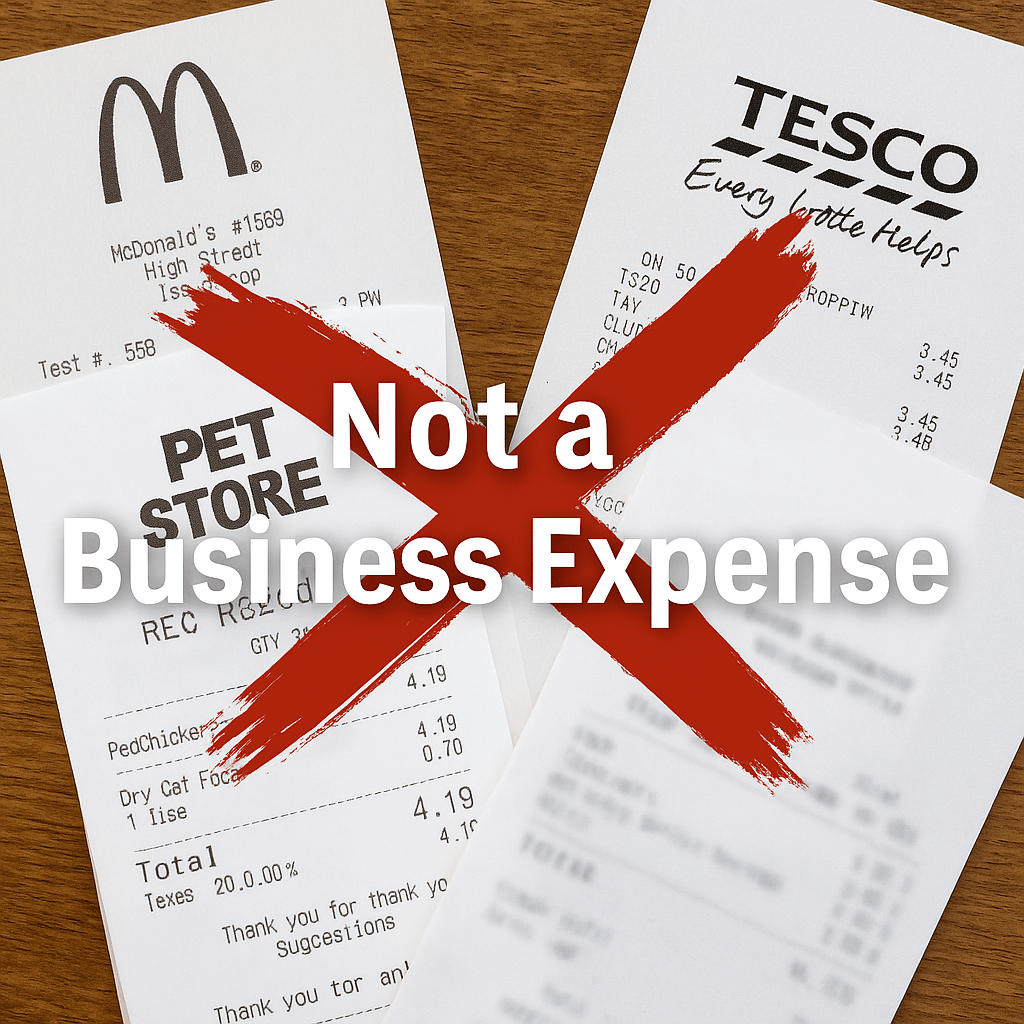Just because you bought it while working… doesn’t mean it’s claimable.
Many self-employed people try to lower their tax bill by claiming everything — food shops, pets, even Ann Summers receipts. But HMRC has one golden rule:
The expense must be “wholly and exclusively” for the purpose of your trade.
If it’s partly personal or not directly tied to your business? It won’t count.
🎥 Watch: What You Can’t Claim as a Sole Trader or Side Hustler (UK 2025) – Real examples of what HMRC will reject, explained simply.
Here are some of the most common expenses that get rejected — and why.
🚫 Food Shopping & Takeaways
You can’t claim your Tesco shop or Deliveroo.
What’s not claimable:
- Takeaways because you were “too busy to cook”
- Coffee runs or snacks at home
- Weekly groceries, even if you work from home
What is claimable:
- Meals while travelling for business
- Food during an overnight stay
HMRC says: Subsistence is allowed only when it’s outside your normal routine.
🚫 Pets
Even if your dog keeps you company while you work — it’s not a business expense.
What’s not claimable:
- Pet food
- Vet bills
- Insurance
Rare exception:
Guard dogs for security businesses, with clear justification.
🚫 Personal Grooming & Clothing
If you’d wear it in daily life, it’s not claimable.
Not allowed:
- Haircuts
- Manicures
- Everyday clothes (even if you wear them for work)
Allowed:
- Uniforms with logos
- Safety equipment (PPE)
- Costumes (if you’re in performance or entertainment)
🚫 Personal Gifts & Ann Summers
If it’s not strictly business-related — don’t claim it.
Not allowed:
- Birthday gifts
- Party items
- Anything from Ann Summers (yes, it’s happened)
Allowed:
- Branded client gifts under £50
- Promotional giveaways with your business name
🚫 Mixed Personal/Business Spending
Trying to “claim what you can” from a personal account usually backfires.
Why it’s a problem:
- It’s hard to prove what’s business
- You risk over-claiming
- You’ll pay your accountant extra to untangle it
Best practice:
Open a separate bank account for the business. Keep business spend separate. Track receipts properly.
✅ Summary: The Rule is Simple
If it’s not 100% for your business, don’t claim it.
When in doubt, ask yourself:
“Would I buy this if I didn’t have the business?”
If the answer is yes — HMRC probably won’t allow it.
Over-claiming business expenses is a common mistake. Before you assume something is allowed, read this: Why You Shouldn’t Make Assumptions With HMRC
Want to be sure you’re not over-claiming?
Download our free checklist: Self-Employed Disallowed Expenses Checklist (PDF)
Or book a clarity call and we’ll walk you through it line by line.
